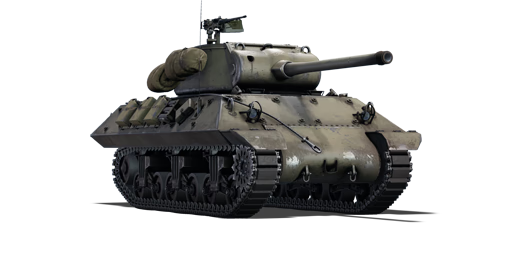



The 90 mm Gun Motor Carriage, M36 is a tank destroyer used by the U.S. Army during World War II. It used the 3-inch Gun Motor Carriage, M10 chassis, which employed the reliable M4 chassis and engine coupled with sloped armour, with a new turret housing the 90 mm M3 tank gun. With the introduction of advanced German tanks, the standard U.S. tank destroyer, the M10, was quickly becoming obsolete since its main weapon, the 3-inch M7 tank gun, struggled to penetrate the thick frontal armour of these new tanks. Late in the summer of 1942, U.S. engineers started to look into the possibility of a new tank destroyer armed with bigger calibre gun. The Ordnance Department experimented with placing the experimental 90 mm T7 anti-tank gun into the turret of a M10 in October 1942. Following testing, an initial order for 300 vehicles was placed. The T71 prototype was designated as the 90 mm Gun Motor Carriage, M36 following standardisation on June 1, 1944. The M36 first saw combat in Europe in October 1944, officially replacing the M10. It was also used in the Korean War.
Introduced in Update 1.49 "Weapons of Victory", the M36 saw significant upgrades in firepower over the earlier M10. Dealing with more sophisticated German tanks, such as Panthers and Tigers, is significantly easier due to their increased calibre, which results in more armour penetration. Nonetheless, the vehicle is poorly armoured and open-topped, making it vulnerable to strafing by enemy aircraft. Due to minor engine modifications, the M36 is substantially faster than the earlier M10, allowing the player to reach important positions much faster throughout combat.
| Ammunition | Type | Armor penetration (mm) at a distance: | |||||
|---|---|---|---|---|---|---|---|
| 10 m | 100 m | 500 m | 1000 m | 1500 m | 2000 m | ||
| AP | 162 | 160 | 148 | 135 | 123 | 113 | |
| HE | 20 | 20 | 18 | 17 | 16 | 16 | |
| APCBC | 185 | 183 | 173 | 161 | 150 | 140 | |
| APCR | 287 | 281 | 259 | 234 | 211 | 191 | |
| Smoke | 5 | 5 | 5 | 5 | 5 | 5 | |
| Belt | Belt filling | Armor penetration (mm) at a distance: | |||||
|---|---|---|---|---|---|---|---|
| 10 m | 100 m | 500 m | 1000 m | 1500 m | 2000 m | ||
| API-T/I/AP/API-T | 31 | 29 | 21 | 14 | 9 | 6 | |












Mobility | |
|---|---|
Protection |
|---|
Firepower | |
|---|---|